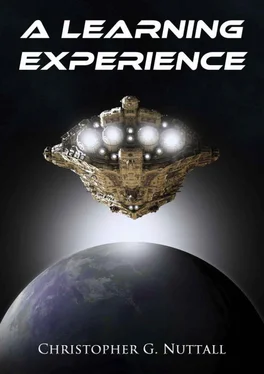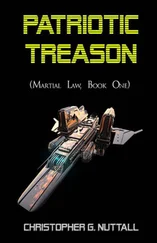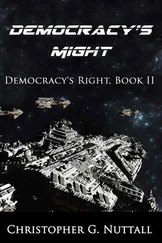Shadow Warrior, Earth Orbit
Jumping into a combat situation had always given Edward Romford the shakes, even before he’d been crippled and forced to face the fact that he’d never walk again. He was fine walking to the line of battle, or driving a Bradley towards the sound of the guns, but dropping from an aircraft and parachuting into the combat zone scared the pants off him. In that sense, the teleporter was actually worse, with a brief interval when the enemy could shoot at him and he couldn’t even see them.
The silver light faded away, revealing the bridge of an alien starship. Like the first starship, it was a strange mixture of technology, with several pieces that might come from a previously unknown race. The aliens were already staggering as the stun grenades took effect, but several of them had managed to don masks before it was too late. Edward silently gave them points for earnestness, even though he hated what he’d read of the Horde. He’d hated wearing MOPP suits too.
He lifted his weapon as soon as he orientated himself and opened fire, spraying stun pulses over the entire compartment. The stunner was a fantastic weapon, he decided, as the remaining aliens hit the deck. It was easy enough to point and shoot, then sort everyone out afterwards. Indeed, he had a feeling that police departments across the USA would be trying to buy stunners as soon as they went on the market. But that would be years in the future.
Bracing himself, he stepped forward, hunting for the alien in charge. The starship’s commander had fallen off his throne, somehow; Edward couldn’t help thinking of a spider that had been flipped upside down by a cruel human as he rolled the alien over and tried to remove the neural interface. It stubbornly refused to budge and, despite its apparent frailty, wouldn’t come free when he pulled at it. As far as he could tell, it had merged with its owner’s flesh.
He keyed his communicator as the rest of the team spread through the starship, stunning the handful of remaining aliens. “Sir, I can’t disengage the neural interface.”
There was a long pause. “I killed the last one,” Stuart said, grimly. “They don’t disengage unless commanded to do so or if their owner is dead.”
Edward gritted his teeth, then drew his knife from his belt and sliced open the alien’s throat. Foul-smelling green blood cascaded out, pooling on the already scarred and tainted deck, as the alien breathed its last. The interface hummed slightly, then withdrew from the alien’s skull. As soon as it was free, Edward felt an odd compulsion to take it for himself and place it on his head.
He fought it off as he picked the headband up and passed it to the volunteer. The volunteer took it and placed it on his head, then winced as the interface made contact with his brain. From what Edward had been told, the experience was painful, but the volunteer’s face looked as if he were on the verge of collapsing into madness. Eventually, finally, he brought the link under control.
“I think this one was made by different people,” he said, as he took control of the starship. “The operating system appears to be completely different.”
“I see,” Edward said. “Does that mean you can’t handle the ship?”
“I can handle it,” the volunteer assured him. “It just took some time for the device to adapt to a human brain.”
Edward nodded, then keyed his communicator again. “Target secured,” he said. “I say again, target secured.”
It had been easy, he knew, but the Hordesmen had suspected nothing until it was far too late for them to escape. If they realised that the Sol System was becoming a black hole for their ships, they’d either give the system a wide berth or send a much more formidable fleet to challenge Earth’s defences. By then, humanity had better be ready to defend itself.
“Understood,” Stuart said. “Take the ship to the reception point. We’ll deal with the prisoners there.”
* * *
“Welcome to Alcatraz,” Graham Rochester said. “Our primary penal centre for alien POWs.”
Steve had to smile. Alcatraz was nothing more than a dome of lunar rock, covering an area big enough for a dozen football fields. The only way in and out was through an airlock that wouldn’t open unless a modified shuttle or tractor had already docked there and exchanged security codes. In the unlikely event of the prisoners managing to force their way through the airlock, they’d find themselves breathing hard vacuum. If they weren’t careful, the entire prison would decompress.
“We’ve included a sizable supply of their food,” Rochester continued. “Once they wake up, we’ll send a holographic projection into the prison and explain the state of affairs. I don’t think they can kill themselves with what they have on hand, but…”
He shrugged. “Overall, given their honour code, they probably will try to end their lives,” he warned. “But we can’t guard against that without keeping them stunned indefinitely, which will eventually kill them anyway.”
“Understood,” Steve said. On the display, the alien prisoners were sleeping peacefully. None of them had been particularly injured, but four had died when they’d collapsed at the wrong time and injured themselves when they fell. Their bodies had been shipped to a medical centre, where they would be examined carefully by human scientists. “Do you have any other concerns?”
“The Hordesmen don’t treat their prisoners very well,” Rochester said. “It occurs to me that we could try to convert some of the POWs to our side. They’d be killed if we sent them home, sir. They have to know it.”
“Bastards,” Steve said. What sort of idiot would blame someone for being taken prisoner when there had been literally no opportunity to resist? But there had been human cultures like that too, ones that had treated the prisoners they’d taken shamefully. “But if you can get it organised, feel free to try.”
“Yes, sir,” Rochester said. “I’d also like to get a few military policemen up here to help take care of the prisoners. We’ll treat them under the Geneva Conventions as much as possible.”
Steve looked up at him. “We cannot afford to allow them to send messages home,” he said. “That would be far too revealing.”
“Assuming that their bosses are interested in any messages from prisoners,” Rochester commented. “But apart from that, we will treat them fairly well.”
Steve nodded and turned away from the display. “On to more serious matters,” he added, “how are you getting along with Heinlein Colony?”
“Expanding faster and faster,” Rochester said. “The new supplies from Earth really helped, sir. But we are going to need more personnel soon enough. And some proper cooks.”
“I understand,” Steve said. “Just don’t tell me you want to open a McDonald’s franchise up here.”
“It would be better than the crap from the food processors,” Rochester pointed out. Steve had his doubts, but held his tongue. “But I was thinking more of someone experienced in operating a small eatery, rather than a fast food place. Hell, get three or four of them and let them compete for customers. Of course, we’ll need a monetary system first…”
He eyed Steve expectantly. “At the moment, we’re effectively operating a system where people work and we take care of them,” he said. “Alarmingly like communism, really. But that is going to have to change.”
“Another headache,” Steve admitted. He rubbed the side of his forehead, then nodded. “Perhaps we should just pay everyone in American dollars. Or gold.”
Читать дальше












